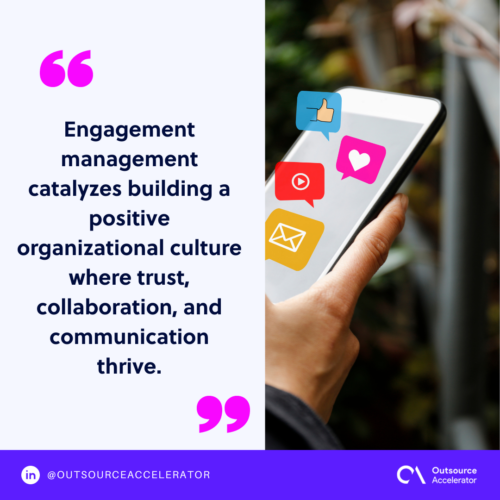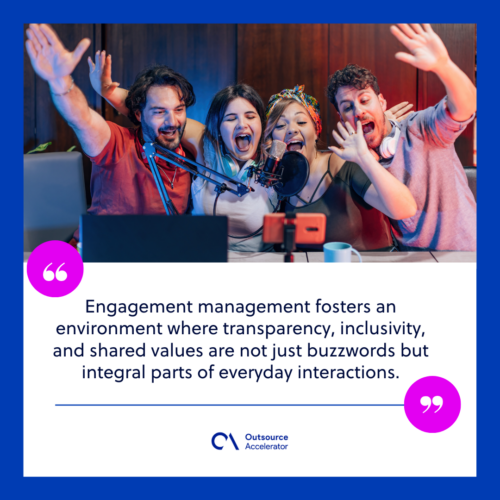What is engagement management?

Fostering robust relationships within the workplace holds profound significance in shaping the organizational landscape.
Collaboration flourishes when individuals feel connected and supported by their colleagues, increasing efficiency and innovation.
Additionally, these bonds contribute significantly to employee well-being, fostering a sense of belonging and reducing feelings of isolation or stress.
Robust workplace relationships also lead to a positive organizational culture where trust and mutual respect prevail, paving the way for open communication. Engagement management revolves around deliberately fostering these relationships.
This article explores engagement management and its significant benefits. Learn how to achieve this strategy to sustain long-lasting business connections and employee engagement.
Engagement management defined
Engagement management systematically orchestrates stakeholder interactions and relationships, including employees, customers, partners, and the broader community.
It includes deliberate strategies and initiatives to foster meaningful, mutually beneficial connections within and outside an organization.
Its importance lies in its capacity to shape the very fabric of an organization.
Engagement management catalyzes building a positive organizational culture where trust, collaboration, and communication thrive.
It serves as a framework for optimizing the broader engagement, ensuring its success while nurturing and fortifying the vital connections between suppliers and clients.

Engagement management vs. Project management
Engagement and project management are distinct yet complementary approaches crucial to organizational success.
While both involve planning, execution, and achieving desired outcomes, they operate on different principles and focus areas.
Project management primarily revolves around efficiently executing specific tasks and deliverables within defined time, budget, and scope constraints.
It employs methodologies like Gantt charts, critical path analysis, and resource allocation to ensure successful project completion. The emphasis lies on planning, organizing, and controlling resources to achieve predefined objectives within a specified timeframe.
On the other hand, engagement management centers on nurturing relationships and fostering meaningful connections among stakeholders. It prioritizes continuous interaction, collaboration, and communication to build strong, enduring relationships.
Rather than focusing solely on project deliverables, it spans the entirety of stakeholder relationships, aiming to align interests, enhance satisfaction, and drive mutual value creation.
While project management operates within a defined framework with specific endpoints, engagement management is an ongoing process.
Project management deals with the tangible aspects of tasks and timelines, whereas engagement management deals with the intangible aspects of relationships, communication, and satisfaction.
Benefits of engagement management
Here are the reasons why engagement management is important to any organization:
Enhanced employee satisfaction
Engagement management operates as a catalyst for organizational cultures that prioritize the well-being and fulfillment of their employees.
It goes beyond the conventional realms of job roles, acknowledging the human aspect within the workspace.
Engagement management cultivates a sense of significance among employees where voices are heard, ideas are valued, and contributions are recognized. It leads to heightened employee morale and drives motivation and dedication toward shared organizational goals.
When employees feel appreciated and respected, innovation thrives, as they are more inclined to voice ideas and experiment without fear of repercussions.
Moreover, a workplace fostering employee satisfaction through engagement management experiences increased productivity and retention rates.
Remember that employees are more likely to commit to an organization that provides a supportive atmosphere for their professional and personal development.
Greater customer satisfaction
Engagement management extends its influence beyond internal stakeholders, profoundly impacting the satisfaction and loyalty of customers.
By actively engaging with customers, understanding their needs, and incorporating their feedback into business strategies, organizations can elevate the customer experience.
This proactive approach addresses immediate concerns and builds long-term trust and loyalty.
Customers feel valued when their opinions are acknowledged and acted upon, leading to stronger relationships.
Through engagement management, businesses can tailor their products or services to meet customer expectations, fostering a deeper sense of connection and advocacy.
Ultimately, this elevated level of customer satisfaction translates into repeat business, positive word-of-mouth recommendations, and a competitive edge in the market.
Positive organizational culture
Engagement management is the cornerstone of cultivating a positive organizational culture that transcends operational procedures. It fosters an environment where transparency, inclusivity, and shared values are not just buzzwords but integral parts of everyday interactions.
Such a culture promotes colleague trust and respect, encourages collaboration, and celebrates diversity.
When employees feel included and aligned with the organizational values, they are more likely to exhibit higher morale and a stronger sense of purpose in their work.
A positive culture also facilitates smoother communication channels, reducing conflicts, and fostering a more cohesive and supportive workplace.
Furthermore, organizations prioritizing building a positive culture through engagement management witness the following:
- Increased employee engagement
- Improved teamwork
- Overall boost in productivity and innovation

Challenges of engagement management
Despite its manifold benefits, engagement management isn’t without its challenges.
Handling resistance to change
One significant hurdle is resistance to change. Implementing engagement management requires a shift in organizational mindset and practices, which can face resistance from established traditional methods.
Overcoming resistance to change demands robust change management strategies, clear communication, and leadership commitment. This is to instill a culture receptive to engagement practices gradually.
Balancing stakeholders’ expectations
Another challenge lies in managing diverse stakeholder expectations. Different stakeholders—employees, customers, partners—have varying needs, priorities, and communication preferences.
Balancing these diverse expectations while maintaining consistency in engagement efforts can be complex.
Organizations must employ tailored strategies to address specific stakeholder needs and preferences, ensuring inclusivity and fairness in their engagement approaches.
Maintaining consistent client engagement
Consistency in engagement endeavors also poses a challenge. Sustaining continuous, meaningful interactions with stakeholders demands dedicated resources and efforts.
Maintaining consistent engagement practices can be challenging amid competing priorities and dynamic business environments. It requires commitment, well-defined strategies, and integrating engagement efforts into the organizational culture and operations.
Moreover, measuring the impact and effectiveness of engagement management initiatives is a significant challenge.
Quantifying the ROI
Quantifying the return on investment (ROI) of relationship-building endeavors can be elusive, making it challenging to justify resource allocation. It also makes it hard to demonstrate the tangible benefits of engagement efforts.
Establishing relevant metrics and evaluation mechanisms becomes crucial to gauge the success and refine engagement strategies.
Navigating these challenges demands strategic planning and a continuous commitment to refining engagement management approaches that align with stakeholders’ evolving needs.
How to achieve engagement management
Efficiently navigating the intricacies of engagement management requires a multifaceted approach that integrates various strategies and practices.
Here are key strategies to achieve and sustain organizational engagement management effectively:
Foster open communication
Fostering open communication is a fundamental pillar in effective engagement management.
Transparency serves as the bedrock upon which trust and collaborative relationships flourish. It involves creating an environment where information flows freely, ensuring stakeholders are well-informed and empowered.
Clear communication channels convey organizational objectives and decisions and encourage an open dialogue that welcomes diverse perspectives.
Listening to stakeholders’ viewpoints, concerns, and suggestions demonstrates a commitment to understanding their needs and values.
Encourage active participation
Active participation from all stakeholders is paramount for successfully implementing engagement management strategies.
Encouraging involvement and soliciting contributions create a sense of ownership and accountability among individuals within the organization.
Organizations cultivate a shared sense of purpose and commitment toward common goals by ensuring everyone’s input is valued and respected.
Active participation boosts engagement levels and reinforces that each stakeholder plays a vital role in the organization’s success.
Establish clear goals
Set clear and attainable objectives that are aligned with the interests and expectations of stakeholders. Definitive goals serve as a guiding light, outlining the path for engagement strategies and initiatives.
Transparently communicating these goals throughout the organization lets everyone understand their role in contributing to these broader objectives.
This clarity fosters unity of purpose, aligns efforts, and minimizes ambiguity, allowing everyone involved to work cohesively towards shared milestones.
Provide regular feedback
Regular and constructive feedback is a proactive approach that nurtures growth and development among stakeholders.
Organizations reinforce positive behaviors and efforts by offering timely insights and acknowledging contributions.
When thoughtfully delivered, feedback highlights accomplishments and steers stakeholders toward aligned objectives.
Offer opportunities for growth
An instrumental aspect of achieving engagement management is prioritizing continual growth and development. Organizations committed to nurturing engagement actively invest in employee learning and development opportunities.
Providing access to training programs, workshops, and mentorship initiatives empowers individuals to enhance their skills and expertise.
This investment not only elevates the capabilities of individuals but also strengthens their connection to the organization, fostering continual improvement and progress.

Recognize achievements
Recognizing and celebrating achievements publicly boosts morale and shows stakeholders that their contributions are valued and appreciated.
Acknowledging milestones, whether individual or collective, sends a powerful message of appreciation and encouragement.
This recognition goes beyond mere acknowledgment; it reinforces positive behaviors and motivates individuals to continue their exceptional performance.
Create a positive work culture
Celebrating diversity and inclusivity acknowledges the richness of different perspectives and backgrounds.
When employees feel supported and cared for, they’re more likely to engage actively, contribute meaningfully, and forge stronger connections within the workplace.
This positive work culture enhances engagement and elevates overall satisfaction, leading to a motivated, empowered, and high-performing team.
Embrace collaboration
Engagement management thrives on the spirit of collaboration. Encouraging and facilitating cross-functional collaboration and stakeholder partnerships develops innovation and creativity.
When diverse perspectives converge, ideas flourish, creating groundbreaking solutions and approaches.
Collaborative efforts also build mutual understanding among stakeholders, breaking down silos and promoting a shared vision.
By embracing collaboration, organizations harness their teams’ collective intelligence and creativity, leading to more robust problem-solving and efficient decision-making.
This approach enhances engagement and strengthens stakeholder relationships, creating a foundation for sustained success.
Maintaining relationships through engagement management
By prioritizing meaningful connections and fostering a culture of engagement, businesses can pave the way for sustained growth and prosperity.
Beyond initiation, sustaining relationships demands ongoing commitment and adaptability.
Regularly reassessing engagement strategies, staying attuned to stakeholders’ evolving needs, and consistently nurturing connections are crucial for long-term relationship sustainability.







 Independent
Independent




